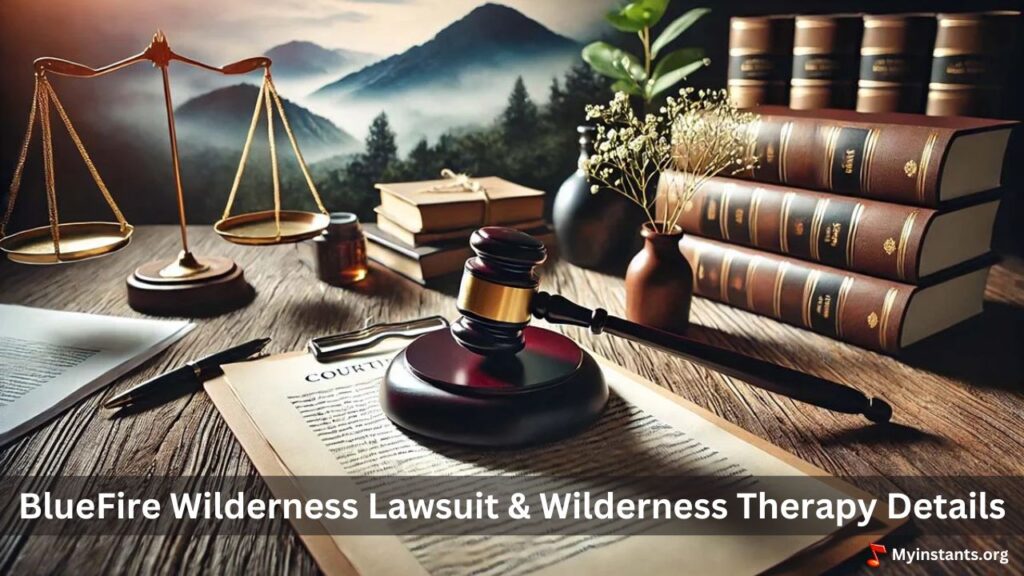Bluefire Wilderness Lawsuit: An In-Depth Exploration

When discussing wilderness therapy programs, bluefire wilderness lawsuit Therapy often comes to mind as one of the prominent names in the industry. However, the term “Bluefire Wilderness lawsuit” has sparked curiosity and concern among those interested in such programs. This article delves deep into the lawsuits’ implications and the broader conversation around wilderness therapy programs.
Understanding bluefire wilderness lawsuit
bluefire wilderness lawsuit Therapy is a therapeutic program for adolescents and young adults that helps them overcome various challenges. These challenges often include behavioral issues, mental health struggles, and difficulties with family dynamics. Utilizing the transformative power of nature, the program aims to guide participants through self-discovery, growth, and healing.

Programs like Bluefire involve outdoor adventures, group therapy sessions, and individual counseling. The goal is to create an environment where participants can disconnect from distractions like technology and focus on their personal growth. The blend of wilderness activities and therapeutic interventions has proven effective for many young people and their families. bluefire wilderness lawsuit
However, despite the program’s popularity and success stories, bluefire wilderness lawsuit has not been immune to controversy. Lawsuits have emerged, highlighting the potential risks and ethical considerations involved in wilderness therapy programs.
What Led to the Bluefire Wilderness Lawsuit?
The emergence of lawsuits against bluefire wilderness lawsuit Therapy has raised questions about such programs’ practices and safety protocols. While the details of individual cases vary, common themes have surfaced, pointing to issues such as safety concerns, staff qualifications, and the overall treatment of participants.
One major issue cited in lawsuits is the alleged lack of adequate preparation or oversight in high-risk outdoor activities. Wilderness therapy often involves activities like hiking, camping, and rock climbing, which carry inherent risks. Critics argue that inadequate supervision or poorly trained staff can exacerbate these risks, leading to injuries or worse. bluefire wilderness lawsuit
Another recurring concern involves claims of emotional or psychological harm. Some former participants and their families allege that the therapeutic methods employed were overly harsh or inappropriate, resulting in long-term adverse effects instead of healing. bluefire wilderness lawsuit
These lawsuits often stem from deeply personal and painful experiences, making them a focal point in the debate over the safety and efficacy of wilderness therapy programs. Understanding these claims is crucial for anyone considering enrolling in such a program. bluefire wilderness lawsuit
Safety Concerns in Wilderness Therapy
Safety is paramount for parents and guardians considering wilderness therapy for their children. Unfortunately, incidents reported in lawsuits against Bluefire and similar programs highlight gaps in safety measures that need to be addressed.
One common allegation is the failure to adequately assess participants’ physical and emotional readiness before engaging in strenuous outdoor activities. For example, individuals with preexisting medical conditions or mental health issues may require special accommodations that are not always provided.
Another aspect of safety concerns revolves around the training and qualifications of staff members. Critics argue that some programs employ staff lacking the expertise to handle emergencies or provide appropriate therapeutic support. This can make participants feel unsafe or unsupported, undermining the program’s goals.
While proponents of wilderness therapy emphasize the transformative potential of these experiences, lawsuits underscore the need for robust safety protocols and transparent communication with families.
Ethical Considerations in Wilderness Therapy
Beyond safety, ethical questions about the methods and practices of wilderness therapy programs have fueled legal challenges against Bluefire. Central to these concerns are issues of consent, communication, and the overall treatment of participants.
Some lawsuits allege that participants were subjected to treatment methods they did not fully understand or agree to. This lack of informed consent can create a sense of mistrust and even trauma for participants. Moreover, families have raised concerns about being kept in the dark regarding their child’s progress or the specifics of the program’s approach.
Another ethical issue involves balancing pushing participants out of their comfort zones and ensuring their emotional well-being. While discomfort is often necessary for growth, critics argue that programs must carefully avoid harmful or overly punitive practices.
These ethical dilemmas highlight the importance of clear guidelines and accountability within the industry. Lawsuits like those against Bluefire remind us that therapeutic programs must prioritize participants’ dignity and autonomy.
The Role of Regulation in Wilderness Therapy
One of the challenges facing the wilderness therapy industry is the lack of standardized regulations. Unlike traditional therapy settings, wilderness programs often operate in remote locations and involve unique risks. This has led to calls for greater oversight to ensure participant safety and program integrity.
Lawsuits against Bluefire have brought attention to the gaps in regulation that allow some programs to operate with minimal accountability. For example, no universally accepted standards for staff training or participant safety in wilderness therapy exist. This can result in significant variability in the quality of care provided.
Advocates for regulation argue that clear standards would protect participants and enhance the credibility of wilderness therapy programs. By establishing consistent benchmarks for safety, training, and ethical practices, the industry could address many of the concerns raised in lawsuits and improve participants’ outcomes.
The Impact of Lawsuits on Families and Participants
The legal battles surrounding Bluefire Wilderness Therapy have far-reaching implications for current and prospective participants. For families, these lawsuits often bring up difficult questions about trust, safety, and the decision to seek alternative therapies for their loved ones.
Many families turn to wilderness therapy as a last resort, hoping to find solutions for their child’s struggles. The emergence of lawsuits can create additional stress, leaving parents questioning whether they made the right choice. For some, the legal proceedings provide a sense of validation and a path toward accountability. For others, they represent a painful reminder of unmet expectations and broken trust.
Participants, too, may experience a range of emotions in the wake of legal action. Those who had positive experiences may feel negative accounts overshadow their stories, while those who feel harmed may struggle to find closure. These complexities underscore the need for a balanced and thoughtful approach to addressing the issues raised in lawsuits.
How Bluefire Wilderness Therapy Has Responded
Bluefire Wilderness Therapy has taken steps to address concerns and improve its practices in the face of lawsuits and criticism. Public statements from the organization often emphasize their commitment to participant safety, staff training, and continuous improvement.
Specific measures reportedly implemented include enhanced safety protocols, additional staff training, and increased transparency with families. Bluefire aims to rebuild trust and demonstrate its dedication to providing practical and ethical therapeutic experiences by taking these steps.
However, critics argue that these efforts must go beyond surface-level changes. Proper accountability requires acknowledging past mistakes and actively involving participants and families in shaping the program’s future.
Lessons Learned from the Bluefire Wilderness Lawsuit
The lawsuits against Bluefire Wilderness Therapy offer valuable lessons for the industry as a whole. At the heart of these cases are questions about how to balance wilderness therapy’s transformative potential with the need for safety, ethics, and accountability.
One key takeaway is the importance of informed consent and open communication. Families must clearly understand what to expect from a program, including potential risks and the measures in place to mitigate them. This transparency can help build trust and set realistic expectations for all parties involved.
Another lesson involves the role of oversight and regulation. Establishing industry-wide standards can provide a framework for ensuring participant safety and program integrity. By embracing these standards, wilderness therapy programs can enhance their credibility and better serve participants.
Finally, the lawsuits underscore the need for continuous self-reflection and improvement within the industry. Programs like bluefire wilderness lawsuit must be willing to listen to feedback, address concerns, and evolve in response to changing needs and expectations.
Conclusion: Navigating the Complexities of Wilderness Therapy
The conversation around the Bluefire Wilderness lawsuit highlights the complexities of wilderness therapy as an alternative approach to healing and growth. While the program has helped many participants achieve transformative results, the lawsuits serve as a reminder of the importance of safety, ethics, and accountability.
These cases underscore the need for thorough research and careful consideration for families considering wilderness therapy. By asking the right questions and seeking programs with a demonstrated commitment to best practices, families can make informed decisions prioritizing their loved one’s well- being. bluefire wilderness lawsuit
Ultimately, the goal of wilderness therapy should be to empower participants and support their journey toward healing. By addressing the challenges raised in lawsuits and striving for continuous improvement, programs like bluefire wilderness lawsuit can uphold this mission and continue to make a positive impact.